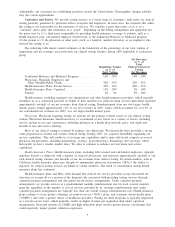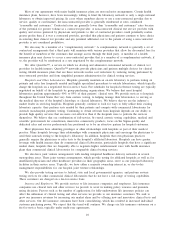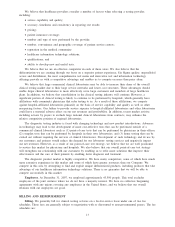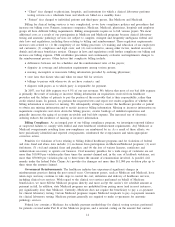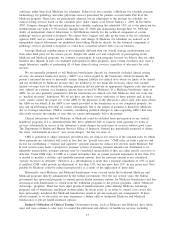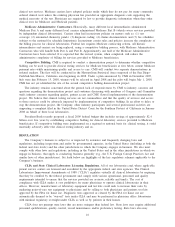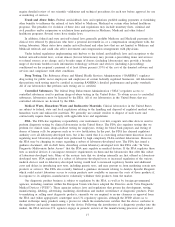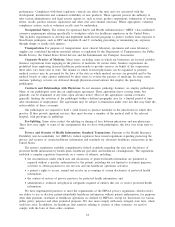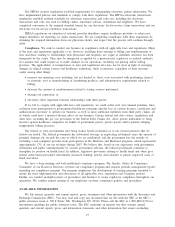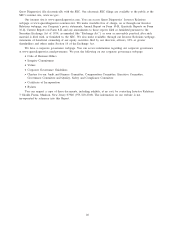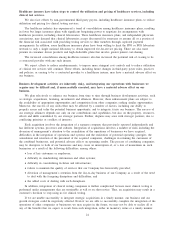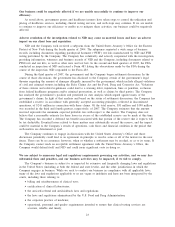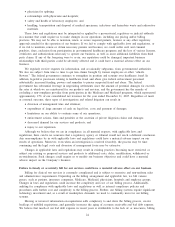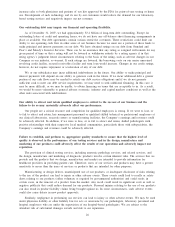Quest Diagnostics 2007 Annual Report Download - page 27
Download and view the complete annual report
Please find page 27 of the 2007 Quest Diagnostics annual report below. You can navigate through the pages in the report by either clicking on the pages listed below, or by using the keyword search tool below to find specific information within the annual report.performance. Compliance with these regulatory controls can affect the time and cost associated with the
development, introduction and continued availability of new products. These agencies possess the authority to
take various administrative and legal actions against us, such as fines, product suspensions, submission of warning
letters, recalls, product seizures, injunctions and other civil and criminal sanctions. Where appropriate, voluntary
compliance actions, such as voluntary recalls, may be undertaken.
Occupational Safety. The federal Occupational Safety and Health Administration (“OSHA”) has established
extensive requirements relating specifically to workplace safety for healthcare employers in the United States.
This includes requirements to develop and implement multi-faceted programs to protect workers from exposure to
blood-borne pathogens, such as HIV and hepatitis B and C, including preventing or minimizing any exposure
through sharps or needle stick injuries.
Transportation. For purposes of transportation, most clinical laboratory specimens and some laboratory
supplies are considered hazardous materials subject to regulation by the Department of Transportation, the Public
Health Service, the United States Postal Service and the International Air Transport Association.
Corporate Practice of Medicine. Many states, including some in which our businesses are located, prohibit
business corporations from engaging in the practice of medicine. In certain states, business corporations are
prohibited from employing licensed healthcare professionals to provide services on behalf of the corporation;
these rules vary from state to state. The manner in which licensed physicians can be organized to perform
medical services may be governed by the laws of the state in which medical services are provided and by the
medical boards or other entities authorized by these states to oversee the practice of medicine. In some states,
anatomic pathology services are delivered through physician-owned entities that employ the practicing
pathologists.
Contracts and Relationships with Physicians. In our anatomic pathology business, we employ pathologists.
Many of our pathologists enter into an employment agreement. These agreements have varying terms, but
generally can be terminated at any time, upon advance notice. Most of the agreements contain covenants
generally limiting the activities of the pathologist within a defined geographic area for a limited period of time
after termination of employment. The agreements may be subject to limitations under state law that may limit the
enforceability of these covenants.
Our pathologists are required to hold a valid license to practice medicine in the jurisdiction in which they
practice. If they provide inpatient services, they must become a member of the medical staff at the relevant
hospital, with privileges in pathology.
Fee-Splitting. Some states restrict the splitting or sharing of fees between physicians and non-physicians.
These laws may apply to some of the arrangements that we have with pathologists; the laws vary from state to
state.
Privacy and Security of Health Information; Standard Transactions. Pursuant to the Health Insurance
Portability and Accountability Act (HIPAA), federal regulators have issued regulations regarding protecting the
privacy and security of certain healthcare information and standards for electronic healthcare transactions in the
United States.
The privacy regulations establish comprehensive federal standards regarding the uses and disclosures of
protected health information by health plans, healthcare providers and healthcare clearinghouses. The regulations
establish a complex regulatory framework on a variety of subjects, including:
•the circumstances under which uses and disclosures of protected health information are permitted or
required without a specific authorization by the patient, including but not limited to treatment purposes,
activities to obtain payment for our services and our healthcare operations activities;
•a patient’s rights to access, amend and receive an accounting of certain disclosures of protected health
information;
•the content of notices of privacy practices for protected health information; and
•administrative, technical and physical safeguards required of entities that use or receive protected health
information.
We have implemented practices to meet the requirements of the HIPAA privacy regulations, which restrict
our ability to use or disclose patient-identifiable healthcare information without patient authorization, for purposes
other than payment, treatment or healthcare operations (as defined by HIPAA), except for disclosures for various
public policy purposes and other permitted purposes. We also must comply with more stringent state laws, where
such laws exist. In addition, for healthcare data transfers relating to citizens of other countries, we need to
comply with the laws of those other countries.
18



